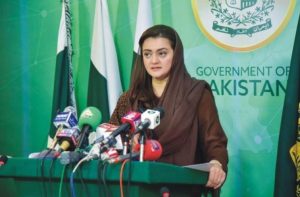The government is reportedly “not keen” to hold talks with the PTI.
According to the minister, the two sides do not share an agenda.

ISLAMABAD: The government on Thursday turned down the PTI’s most recent offer for talks, citing the absence of a shared agenda between the two parties as the reason for its decision. According to the government, the PTI wants early elections, while the government will not budge from its position of holding the elections on time.
While speaking with The Express Tribune, the Federal Minister for Information and Broadcasting, Marriyum Aurangzeb, made it clear that neither overt nor covert negotiations were being done with the previous ruling party, and that any suspicions about such talks were just that: guesses.
In response to the Pakistan Tehreek-e-Insaf (PTI) stating that it is eager to talk to the federal government about the upcoming elections, the spokesperson for the federal government stated that conversations cannot take place while there are preexisting conditions linked to it.
The minister was referring to the PTI’s demand that the government should first declare the date for the next general elections, and then both sides may get together to decide the framework for the next elections. This was the demand that the minister was referring to when he made his statement.
According to recent reports, the PTI has recently imposed a new condition, stating that it will only agree to hold elections in the months of August or September in the coming year provided the government provides an economic plan.
PTI leader Fawad Chaudhry tweeted on Thursday that the organisation was prepared to negotiate changes to the election framework and the Election Commission of Pakistan (ECP) if the government announced early elections.
Marriyum, on the other hand, was very clear that elections would take place only after the current government served out the remainder of its constitutional term.
She stated that there is now no common agenda for discussions between the government and the PTI. “For talks, there should be a single agenda item,” she remarked. What is left to talk about is the fact that Imran wants elections but the administration does not.
PTI Chairman Imran Khan’s announcement that his party would opt out of the “corrupt system” and could either resign en masse or go the dissolution of the Punjab and Khyber Pakhtunkhwa (K-P) Assemblies was followed by the PTI’s latest conditional offer clothed as its “willingness for talks.” This offer came on the heels of Khan’s announcement that his party would opt out of the “corrupt system.”
The leadership of the PTI is currently having back-to-back party meetings to establish a consensus on whether or not it should resign, disband two out of four provincial assemblies, and most importantly, when should it do so. They are also contemplating on their available options.
A number of weeks have passed since Prime Minister Shehbaz Sharif made a peace overture to the head of the PTI, but the overture was met with silence by the party that had previously held the position of ruling authority.
Imran has never accepted the premier’s offers to talk, even when he was the opposition leader in the National Assembly (NA), and he has even refused to shake hands with his opponents out of fear that doing so “normalises corruption.” The premier has made numerous offers to talk, including during the time when he was the opposition leader in the NA.
Imran has been accusing his political adversaries of decades of treachery and corruption, therefore for many years he has avoided any and all opportunities to sit down with them. In doing so, he has created clear battle lines against them.
While referring to Prime Minister Shehbaz and the coalition parties’ consistent stance that elections would be held on time, several other members of the ruling alliance, in addition to Marriyum, said that holding snap polls would also be difficult without a fresh census, the subsequent delimitation exercise, and keeping in line with the current situation in the flood-affected areas. Marriyum was the only member of the ruling alliance to make this statement.
Accepting the Pakistan Tehreek-e-Insaf chairman’s requirements before sitting across from him for talks would be like to handing him victory before they even begin, according to a major member of the Pakistan Muslim League-Nawaz (PML-N), who asked not to be identified but made the statement.
Aside from that, he stated that there would be no use in continuing discussions if the PTI already gets a date for the following elections. Also, he stated that coming to an agreement and announcing the date for the next elections would be detrimental to the position of the administration and would give the other party a “perceived win.”
Fahd Hussain, the spokesperson for Prime Minister Shehbaz Sharif, stated just a few days before the PTI’s long march that aimed to force snap elections that the government had been very clear that elections would be held on the scheduled time. This statement was made before the PTI’s intention to force snap elections.
He had foreseen that Imran would be left with a sour taste in his mouth if he was under the impression that he could exert enough pressure on the administration to convince them to call early elections.
Imran had decided that he would not march on to the federal capital but rather go for en masse resignations, so the PTI’s lengthy march came to an end without gaining an election date. This was because Imran had decided that he would not march on to the federal capital.
After some time, the PTI included the possibility of dissolving the assemblies, although it has not yet made a definitive decision regarding when it intends to carry out this option.










































